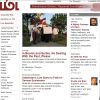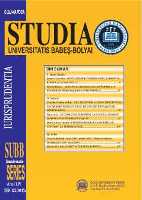CUVÂNTUL PRIMULUI DECAN AL FACULTĂŢII DE BUSINESS
Author(s): Aurel Ioan Giurgiu / Language(s): Romanian
/ Issue: 3/2009
Instituirea Facultăţii de Bussines a Universităţii "Babes-Bolyai" din Cluj-Napoca a
avut loc în primul deceniu de după revoluţia decembristă având la bază două idei: una
externă si a doua din interiorul universitaţii clujene. Prima a fost reprezentată în anul 1991 de iniţiativa profesorului Colin Love de la Nothingam Trent University – care vizitase Facultatea de Stiinţe Economice din Cluj-Napoca în 1987 – de a crea o scoala de business la Cluj prin intermediul unui program Tempus finanţat de Comunitatea Europeeană (cum se numea atunci actuala Uniunea Europeană). Scoala era de tip postuniversitar, cu un regim seral, cu o durată de doi ani, fiind destinată reistruirii economice a licenţiatilor noneconomisti, în vederea accelerării adaptării celor care activau deja în câmpul muncii la condiţiile economiei de piaţă care se năstea în România; evident, cursanţii trebuiau sa achite o anumita taxă. Întreaga activitate urma să se desfăsoare în cadrul Facultăţii de Stiinţe Economice a universităţii, fără structuri organizatorice proprii, deci ca o activitate didatică suplimentară, dar cu o denumire oarecum exotică Transylvania Business School.
Comunitatea Europeeană a asigurat logistica necesară, în mod generos, (calculatoare de
ultima generaţie, mobilier, o frumoasa biblioteca în limba engleză) si a finanţat timp de doi ani o seamă de mobilităţi a cadrelor didactice la universităţi străine (în U.K., Grecia,
Portugalia si Franţa). Procesul didactic s-a desfăsurat în forma arătată, anevoios, timp de
doi ani. Au existat diferenţe în modul de apreciere a organizării, conducerii si derulării
activităţii cursului postuniversitar între iniţiatorul programului Tempus – profesorul Colin
Love, pe de o parte si conducerea clujeană, pe de altă parte, diferenţe care au condus în
final la blocaje de comunicare si divirgenţe.
More...



